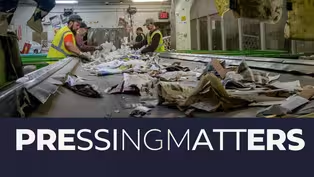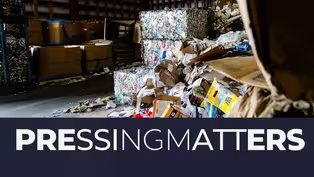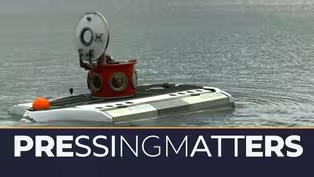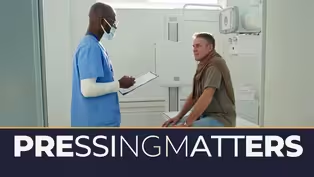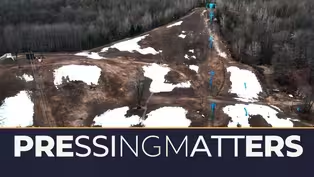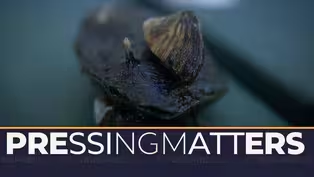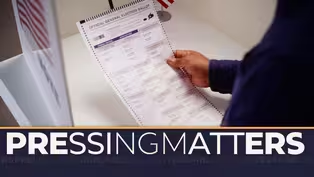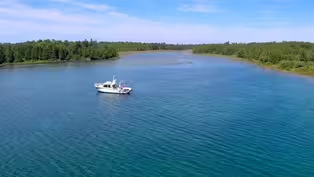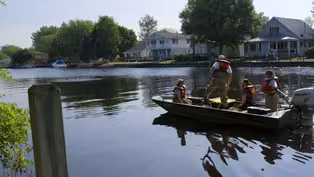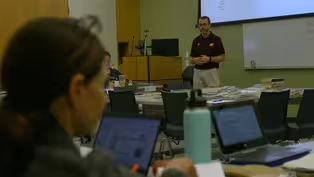Pressing Matters
Pressing Matters | What happens when the recyclables are picked up?
Clip: Season 1 | 9m 20sVideo has Closed Captions
Our knowledge about what happens to the items we recycle stops once we get it out of the house.
The main types of recycling processes can be boiled down to a dual or single stream system. The difference is either all recyclables are collected together or separated. Our knowledge about what happens to the items we recycle stops once we get it out of the house. In Michigan, those types of facilities use either a single or dual stream process - we examine both.
Problems playing video? | Closed Captioning Feedback
Problems playing video? | Closed Captioning Feedback
Pressing Matters is a local public television program presented by WCMU
Pressing Matters
Pressing Matters | What happens when the recyclables are picked up?
Clip: Season 1 | 9m 20sVideo has Closed Captions
The main types of recycling processes can be boiled down to a dual or single stream system. The difference is either all recyclables are collected together or separated. Our knowledge about what happens to the items we recycle stops once we get it out of the house. In Michigan, those types of facilities use either a single or dual stream process - we examine both.
Problems playing video? | Closed Captioning Feedback
How to Watch Pressing Matters
Pressing Matters is available to stream on pbs.org and the free PBS App, available on iPhone, Apple TV, Android TV, Android smartphones, Amazon Fire TV, Amazon Fire Tablet, Roku, Samsung Smart TV, and Vizio.
Providing Support for PBS.org
Learn Moreabout PBS online sponsorshipWelcome back to "Pressing Matters."
With public health concerns growing over the impacts that pollutants like plastic and other waste have on people and the environment so too have efforts to increase recycling participation.
According to the very latest numbers just released, Michigan's recycling rate is the highest it's ever been around 23%.
State officials say Michigan is on track to reach its goal of 30% by 2029.
Meanwhile, the national recycling rate is 32%.
Now, there are many factors that play a role as we learned, recycling, just like operating a landfill, is a business.
In Michigan, it is cheaper to dump waste in a landfill, but that decomposing garbage sends heat trapping methane into the atmosphere.
According to the EPA, those municipal landfills are the nation's third largest source of human induced methane emissions.
And when it comes to recycling, there is no universal policy or practice for people to follow.
What can be recycled and what can't also varies between counties, townships, and communities.
For most of Michigan, the main types of recycling processes can be boiled down to a dual or single stream system.
Now the difference is either all recyclables are collected together or separated between paper and cardboard and containers.
As we learned, there are pros and cons to both systems.
(graphics whooshing) When it comes to recycling, most of our knowledge about what happens to the items, we recycle stops once we get it out of the house.
Now, for those that recycle, we know haulers come and pick it up, or you take it to a nearby collection site.
But then what happens?
For most, it's trucked to a materials recovery facility, also known as MRF.
In Michigan, those types of facilities use either a single or dual stream process to collect, sort, and eventually ship materials to product manufacturers.
Both system use a network of conveyor belts, sorters, and even robots.
(machine whirring) Emmet County Recycling near Harbor Springs uses a dual stream system.
It's a sprawling facility known by many in the industry as the gold standard of recycling.
- Emmett County Recycling is unique and we are dual stream, not a lot of facilities around our dual stream, and that has changed over the last 10, 15, 20 years.
You used to see a lot more dual stream systems.
Dual stream is a little bit more challenging on the collection end, so we have to have trucks with two separate compartments.
Residents have to have two different bins at their house.
We feel strongly that it's the way to go because of contamination.
- [Stephanie] Contamination is what happens when you mix all recyclables together.
Think plastic, paper, aluminum, and cardboard into one bin.
Unrinsed or wet materials can leak onto paper and cardboard or recycled paper bales may have pieces of plastic in it, reducing the overall quality.
Everything that's recycled comes to the facility already separated before being sorted and processed.
But it's tricky because not everything that comes to the line is recyclable.
- So our sorters pick out any garbage, anything bulky, and anything dangerous.
So unfortunately we actually see needles, and sharps, propane tanks, stuff like that.
Things that we do not want on the recycle line.
So our sorters are responsible for picking that material out.
So even just asking residents to think a little bit about where what goes in their bins really helps reduce our contamination.
A lot of single streams are, everything goes in the bin, don't worry about it, we'll take care of it later.
But that leads to a lot of contamination.
And the other reason that we feel strongly about staying with dual stream is because of the financial value of it.
You can kind of see behind us, we sort all of our recyclables into different bales.
Each bale is marketed and sold to a factory that makes it into something new.
Dual stream is much, much cleaner than single stream.
So there's less contamination in the bales that we are sending to the factories, which means the factories are paying us a higher value.
- [Stephanie] Emmet County Recycling makes money by selling sorted and repacked recyclables like plastic, paper, and cardboard back to manufacturers.
- As Emmet County, we have a reputation for having good material.
So a lot of where our material goes is built on relationships.
So we do have someone in our office.
Part of her job is to maintain and build and find those relationships with the end markets.
She works with them.
Sometimes if we have a load that's not perfect, they'll call her, and they'll have a discussion about what they wanna see different or what they're looking for.
95% of the material that we accept here is sent to Michigan factories made into new products in Michigan.
And so that's another thing that makes us unique is we always strive to be highest and best use.
There are a lot of places where we could send our stuff and it could be used for fuel, used for incineration, used for daily landfill cover, but we really try hard to make sure that all of our materials are made into a new product that contribute to the circular economy.
- [Stephanie] Reusing materials over and over again is crucial.
Manufacturers are also taking notice.
You see it in the goods they produce where they're advertising using recycled materials to make their products.
- Manufacturers are doing their best to meet those goals, but actually in Michigan, like Cleantech where we send our plastic water bottles, they aren't getting enough material.
They're having to actually bring material from other states, because there's not enough in Michigan being recovered right now.
So that's definitely a big gap is there's an opportunity for more material to be recovered in Michigan.
The end markets, the factories, they're looking for more material.
- [Stephanie] Ann Arbor recycles is also looking to fill that gap using their single stream process.
Now, they weren't always a single stream processor.
- So they went to a two stream system in the late 80s, early 90s went to a two stream system.
The participation was hard that way.
And that stayed through most of the 1990s until the mid to latter part of the 1990s.
Then it was clear the city was asking people why they didn't recycle, and why they would recycle.
And more convenience is what they were after.
The single stream system looks more like the standard, throw it in the cart kind of a system.
So they moved then to a single stream system, and that was brought on mostly by convenience to the public, and then efficiencies in collection.
'Cause you could put it all together and compact it together and bring it to a facility.
- [Stephanie] Ann Arbor Recycles, CEO Bryan Ukena says, "Moving to a single stream system where haulers don't need to separate recyclables led to more participation in the program."
He credits their team of employees who make it run as smoothly as possible from collecting to processing.
- So when they get here, they get tipped or dumped on the floor.
The loader operator that you saw, Brian, he mixes it into the right recipe, the right amount of cardboard, right amount of containers and so on.
Then he loads it onto a conveyor and then it gets sorted by material.
- [Stephanie] And again, advanced technology, including robots and tools like an optical sorter, are helping the recycling industry become more efficient alongside the employees on the line.
- [Bryan] That's a very specialized job sorting those recyclables.
If you try it for a few hours and you see what it takes to actually do that.
These are very professional people and they have a certain hand-eye coordination and have skills that it's very important that they are able to maintain.
So the less you can burden them, the more accurate they can get and the safer they can do it.
- [Stephanie] While the two systems are different, both operate with the same goals in mind.
Dual stream may cost more on the front end, but produce a cleaner product at the end of the line.
Single stream costs less on the front end, but by being able to collect more and sort at the facility, they're able to sell more back to manufacturers.
Ukena says, "That what matters most is really just taking apart in the process in whatever way works best for you."
- You know, everyone has a little bit different motivation for why they recycle.
And so it's a big thing for people.
You know, it's like, I can't buy an EV car, I can't put solar panels on my roof, but by God I can recycle.
And that's something I can do every single day.
And as I do that every day, I know I'm doing good.
- Now, as you heard, sorters often come across dangerous items like lithium batteries.
Those are not recyclable at the curb and they're extremely flammable.
Some places, including Emmet County, collect them separately.
A good idea is to check your closest recycling center website to see what you can and cannot drop off.
Pressing Matters | What happens when the recyclables are picked up?
Video has Closed Captions
Clip: S1 | 9m 20s | Our knowledge about what happens to the items we recycle stops once we get it out of the house. (9m 20s)
Pressing Matters | Extended Producer Responsibility (EPR) what is it?
Video has Closed Captions
Clip: S1 | 12m 2s | We discuss Extended Producer Responsibility (12m 2s)
Pressing Matters | A New Era of Exploring the Great Lakes
Video has Closed Captions
Clip: S1 | 7m 58s | Pressing Matters Examines A New Era of Exploring the Great Lakes (7m 58s)
Pressing Matters | Rising Cancer Rates in younger Adults
Video has Closed Captions
Clip: S1 | 12m 1s | Pressing Matters examines Rising Cancer Rates in younger Adults (12m 1s)
Pressing Matter |Climate Change Forces Business to Adapt
Video has Closed Captions
Clip: S1 | 5m 56s | Pressing Matters examines how Climate Change Forces Business to Adapt (5m 56s)
Pressing Matters | Invasive species
Video has Closed Captions
Clip: S1 Ep4 | 8m 2s | Pressing Matters | They're Destructive and a nuisance. (8m 2s)
Pressing Matters | Election Day
Video has Closed Captions
Clip: S1 Ep4 | 15m 48s | What you need to know before heading to the polls, on Pressing Matters. (15m 48s)
Video has Closed Captions
Clip: S1 Ep1 | 8m 41s | Water Quality and PFAS in Michigan's water ways. (8m 41s)
Video has Closed Captions
Clip: S1 Ep1 | 9m 20s | Exploring microplastics in our water (9m 20s)
Artificial Intelligence in the Classroom
Video has Closed Captions
Clip: S1 Ep1 | 6m 55s | Artificial Intelligence in the Classroom (6m 55s)
Providing Support for PBS.org
Learn Moreabout PBS online sponsorship
- News and Public Affairs

Top journalists deliver compelling original analysis of the hour's headlines.

- News and Public Affairs

FRONTLINE is investigative journalism that questions, explains and changes our world.












Support for PBS provided by:
Pressing Matters is a local public television program presented by WCMU
